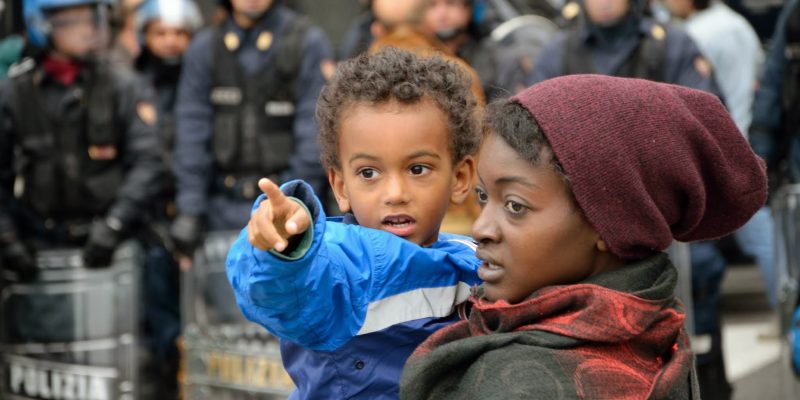1. 85.000 signatures to change Italy’s migration policy
It has been an extraordinarily success for the popular initiative Ero Straniero, advocating for the replacement of the failed Bossi-Fini law on immigration and a definite commitment to integration through law and rights. More than 85.000 signatures have been collected during the six-month campaign, and they were taken to Parliament last Friday. Read the article in Redattore Sociale.
2. Italy, racist violence and indifference
On a regular Saturday night, in Turin, Italy, a Romanian homeless man was set on fire, while in Rome, two migrants (a Bangladeshi and an Egyptian) were violently beaten by a gang of teenagers. These are no isolated incidents, since acts of violence against foreigners have been happening for a long time (as reported in Lunaria’s white book on racism) to the public’s indifference. Read the article by Francesco Cancellato in Linkiesta.
3. Italy, the consequences of labour exploitation
“The terrible truth about your tin of Italian tomatoes”, reads the title of the Guardian report by Isabel Hunter and Lorenzo Di Pietro on an investigation into the death of a seasonal labourer. 47-year-old Abdullah Mohamed, from Sudan, suffered a heart attack while working in the fields of Nardò in July 2011. The report exposes a gangmaster system gone out of control, where sever exploitation is the norm (as Alessandro Leogrande denounced as early as 2015). Also read Stefano Liberti and Fabio Ciconte’s in-depth article in Internazionale.
4. Libya, a prison called Tripoli
Now that fewer and fewer migrants are leaving the Libyan coasts (because Italy is paying Libya millions of euros, as reported by Vice News and HBO), more and more of them are locked and trapped into the hellish detention centres, where women and children suffer the worst fate. Read the reports by Francesca Mannocchi in Vanity Fair, with photographs by Alessio Romenzi, and by Francesco Semprini and Jacob Svendsen in the Guardian.
5. Calais, life after the “Jungle”
On the anniversary of the “final evacuation” of the Calais camp, read Behzad Yaghmaian’s thoughts in Refugees Deeply on how migrants are still arriving in the French border town, where conditions are even worse than a year ago, while the crossing to the UK is even more expensive and dangerous (as we already wrote in our own recent report). Also read the article by Mark Townsend in the Guardian, drawing on the latest report by the Refugee Rights Data Project – on the violence and abuse facing the migrants in transit to Calais.
6. Sweden, explaining the “resignation syndrome”
Suddenly, they withdraw: they cease to play, walk, talk, or even open their eyes. In 2016 alone, 169 children of asylum seekers suffered from this mysterious illness, described by doctors as
Uppgivenhetssyndrom (“resignation syndrome”).This is happening only to children of refugees, and only in Sweden – and no one understands why. Read the story by Linda Pressly in BBC News.
7. Rohingya: it’s genocide
There’s only one conclusion on the Rohingya in Myanmar and Bangladesh: it’s genocide. Read and watch Azeem Ibrahim’s story in CNN – as well as Zara Rahman’s exhaustive report in Irin News on the irresponsible use of data and the dangers of registering the Rohingya (especially with biometric cards) and the update from the Guardian on Bangladesh planning to introduce voluntary sterilisation procedures in its overcrowded Rohingya camps (!).
8. Fear and loathing on Manus
October 31 will mark the closing of Australia’s offshore detention centre on Manus Island, Papua New Guinea, where more than 1,500 asylum seekers have been held over the last 4 years. It is not at all clear, however, what will happen to the 600 people currently detained on the island, who are at risk of ending up in limbo. Read the Guardian coverage, with articles by Georgie Bright and by Helen Davidson, as well as the diary of Behrouz Boochani (an Iranian reported detained on Manus since 2014).
9. Border deaths should be investigated by the International Criminal Court, according to UN Special Rapporteur
Last week, Special Rapporteur of the Human Rights Council , on extrajudicial, summary or arbitrary executions, Agnes Callamard, transmitted to the General Assembly of the United Nations an important new report on the unlawful death of refugees and migrants, calling for the International Criminal Court to investigate on the atrocities. Ioannis Kalpouzos and Itamar Mann’s op-ed in Spiegel illustrates the importance and the implications of the report, while Ben Doherty writing in the Guardian takes a closer look at the report’s singling out Australia for its asylum boat turnbacks.
10. A map of responsibilities for the “refugee crisis”
If hundreds of thousands of people are forced to flee their homes, the fault lies with the European countries fuelling those very same violent conflicts through their exports in weapons. This interactive map by Centre Delàs highlights the connections between Europe’s arms trade and the “refugee crisis”.
Header photo: Anti-racist protest in Turin – via Luca Perino (CC BY-NC-ND 2.0).









